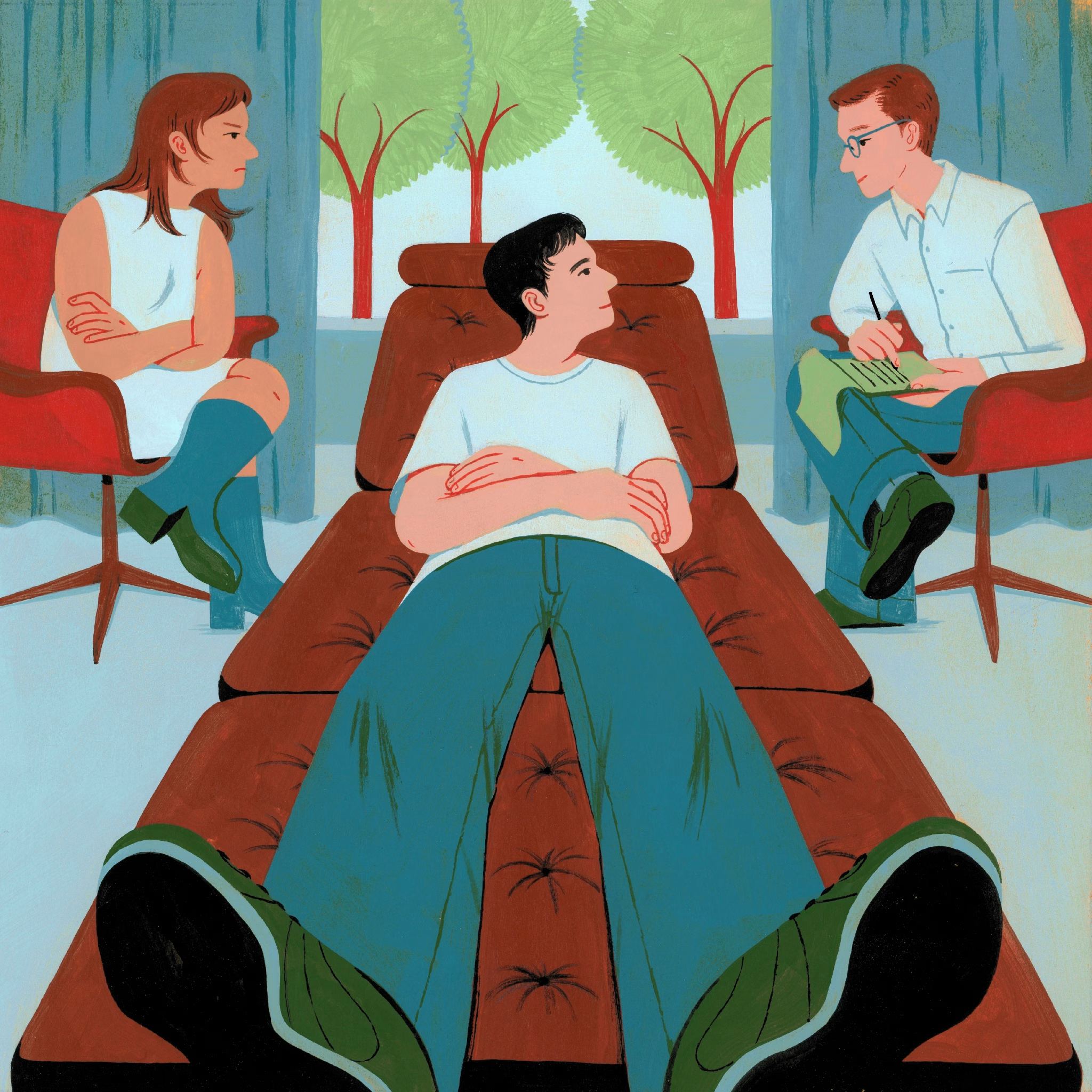I Can’t Stand My Boyfriend’s Therapist, But He Won’t Stop Seeing Him
For the past six years, my boyfriend and I have been in a relationship. Throughout much of my adult life, I’ve been in therapy, which has helped me grow and change. One of the qualities that initially attracted me to him was that he also engaged in therapy and had a positive relationship with his therapist. However, after six years, I feel that he hasn’t made any significant progress. He still avoids difficult conversations, becomes defensive when I bring up issues in our relationship, and seems to be struggling with depression. Worse, he now uses his therapist as a shield, saying things like, “My therapist thinks you’re too hard on me” or “That’s just your anxiety talking.” Instead of helping him grow, his therapist appears to be reinforcing a version of him that allows him to remain emotionally unavailable and shut down. I want him to continue therapy, but I don’t believe this particular therapist is helping.
It’s incredibly challenging to watch someone you love refuse to take steps that could improve their happiness or make your relationship healthier. This is especially difficult when their refusal to change affects the quality of your life together.
You might be right that therapy is hindering rather than helping his ability to connect with you in the ways you hoped for. This could be due to two main reasons. When a therapist only hears one side of the story, individual therapy can sometimes worsen couple dynamics, according to some studies. Additionally, some therapists believe their role is to maintain an unquestioned alliance with their patient and avoid anything that makes them feel criticized or pushed.
While this approach may be comforting, it can also reinforce avoidance and leave problematic patterns in place. Good therapy often requires challenging avoidance, defensiveness, and self-protective stories. A friend can easily affirm why we’re right and everyone else is wrong. The therapist’s task is more complex: to show us how we might be contributing to the very pain we’re trying to escape.
However, criticizing someone’s therapist can be similar to criticizing their romantic partner—it often makes them defensive and protective. This is especially true if your boyfriend has long felt understood and cared for by his therapist, which is likely given how many years he’s been with them.
Although you shouldn’t directly challenge his therapy, you can express what you need differently in the relationship.
Start by asking how you can change
One way to begin this conversation is by acknowledging how you may have contributed to the problem. This approach tends to make people more receptive to feedback than starting with a complaint or demand.
You might say, “I want us to be able to talk more openly about what’s hard between us, and I wonder if there are things I do that make that harder for you?” Or, “You’ve said your therapist thinks I can be critical. I’m open to that. Can you help me understand what you’d like me to do differently?”
Starting this way models the accountability you hope to see in him and reduces the likelihood that he’ll retreat behind the therapist’s authority. Once you’ve shown openness to his feedback, you can describe what you need from him: more engagement, emotional honesty, and willingness to take responsibility for his role in the relationship.
Offer to collaborate
If he’s open to it, suggest joining one of his sessions—not to confront the therapist, but to offer a perspective that could deepen the work. Some therapists welcome this kind of collaboration; others don’t. Either way, the invitation signals that you want to be a respectful part of the solution.
But don’t lose sight of the bigger picture. You can’t endlessly support someone who may be using therapy as a weekly permission slip for inertia. If he’s depressed, medication might help if he’s willing to consider it—but emotional accountability can’t be prescribed. Therapy can be life-changing when it helps people move toward connection. It becomes harmful when it turns into a refuge from change.
While your desire for him to see a different therapist is understandable, it might not solve the problem. Some of us send our partners to therapy hoping the therapist will change them in all the ways we want them to change. Individual therapy can be transformative for our relationships—but only if both partners agree on what each person needs to work on.
Consider couples therapy
In my experience, couples therapy is often a better use of time and money when one person is content with the relationship and the other isn’t. That’s because you can both get support for what needs to change and what might not—individually and as a couple.
Couples therapy can also be more effective because most conflicts persist through unconscious feedback loops. Marital researcher John Gottman and others have found that the “demand-withdraw” or “pursuer-distancer” dynamic is one of the most common predictors of divorce: One person pursues for closeness or reassurance, while the other withdraws or retreats. Each reaction triggers the next, creating a cycle of hurt and misunderstanding that deepens over time. In your case, wanting him to change may cause him to retreat into defensiveness, which can deepen your despair that he’ll never be the partner you need. That worry may then lead you to put even more pressure on him. In therapy, the goal would be to make this pattern visible so that both of you can step out of the reflexive push-and-pull and respond with curiosity rather than reactivity.
So, be clear about what you need, but also realistic about what is possible. If he’s willing to engage, to question his own comfort, and to see therapy as a place for growth rather than justification, there’s hope. If not, you may need to decide whether waiting for him to evolve is still a form of love—or just a habit of hope.
Therapy should strengthen our relationships, not replace them. And if your boyfriend believes that his therapist is the most emotionally responsive person in his life, the problem may not be just in the therapy room—it may be in what’s being avoided outside it.
- Kunci Jawaban IPA Kelas 9 Halaman 44: Uji Kemampuan Bab 2 - December 16, 2025
- Molly-Mae Hague gives a health update on daughter Bambi after the toddler was rushed to hospital - December 16, 2025
- Wagub Aceh: Layanan Kesehatan untuk Korban Banjir Masih Terbatas - December 16, 2025




Leave a Reply